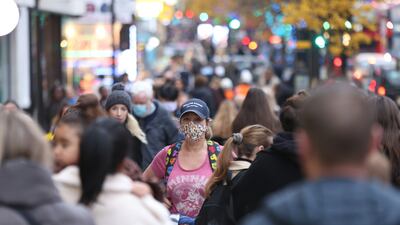Live updates: follow the latest news on Covid-19 variant Omicron
Millions of people in England are embracing the end to most Covid-19 restrictions and hoping that the return to normality is here for the long run.
UK Prime Minister Boris Johnson announced the end to Plan B measures brought in to tackle rising case numbers as the Omicron variant spread across the country.
For Mr Johnson, the lifting of restrictions is a spot of good news as he reels from the fall-out of a scandal involving government office parties that took place during lockdown. He has apologised for missteps during the pandemic but the lockdown parties have angered his party, potentially putting his job at risk.
What are the important dates?
From January 19, work-from-home rules were lifted, meaning an immediate return to the office or other workplace is allowed.
From January 20, secondary-school pupils in classrooms no longer needed to wear face masks.
From January 27, all other face mask rules are dropped, meaning public transport and shops will be mask-free.
The use of Covid passports for entry into large events will end, but companies can still demand use at individual venues.
Some supermarkets, including Sainsbury's, have asked shoppers to mask up and London Mayor Sadiq Khan said the city's public transport system will still require passengers to wear masks.
What is happening to travel rules?
Almost all Covid travel restrictions are being relaxed in time for the school half-term, which begins at the end of the school day on February 11.
From 4am on February 11, fully vaccinated passengers arriving in the UK will no longer have to take a post-arrival lateral flow test.
The easing of travel rules includes a simplified version of the passenger locator form and allows vaccine certificates from 16 additional nations to be used.
Under-18s will continue to be treated as eligible, fully vaccinated passengers, which means they will not face any tests at the UK border.
From February 3, 12 to 15-year-olds will be able to show their vaccination status via the digital NHS pass for international outbound travel.
Unvaccinated passengers will need to show a negative Covid-19 test taken two days before travel, take a post-arrival PCR test and complete the passenger locator form.
What are the travel rules until then?
People travelling to the UK must pre-book a coronavirus test from a private supplier.
These can be lateral flow tests, which typically cost about £19 ($25) and must be taken before the end of the second day after arrival.
There have been widespread concerns around the customer service and prices offered by many testing companies listed on the government’s website.
Testing and quarantine requirements have also badly hit airlines and holiday companies because they put off many people from booking trips.











